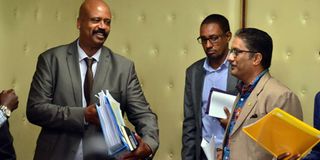All eyes on NMS boss Mohamed Badi as first 100 days in office end

What you need to know:
- President Uhuru Kenyatta established the new office on March 18 to take over the running of four key functions transferred from Governor Mike Sonko’s administration.
- Major-General Mohamed Badi is expected to had a report to Mr Kenyatta on the NMS’ achievements before next week.
All eyes are on Nairobi Metropolitan Service (NMS) Director-General Mohamed Badi as his first 100 days in office will lapse on Sunday.
President Uhuru Kenyatta established the new office on March 18 to take over the running of four key functions transferred from Governor Mike Sonko’s administration.
At the time, the President gave the agency 100 days to achieve specified goals under the transferred functions.
As such, Major-General Badi is expected to had a report to Mr Kenyatta on the NMS’ achievements before next week.
“The NMS is working daily to ensure all the presidential directives are achieved and exceeded and that project sustainability continues for improved living standards long after the 100 days elapse,” he said.
He spoke on Thursday evening when he paid Speaker Beatrice Elachi and several MCAs a courtesy call.
CORRUPTION
The agency was tasked with ending corruption and dismantling the cartels that have hindered Nairobi’s development.
In line with this directive, Mr Badi has disbanded City Hall’s development plans approval committees, sending a strong statement of intent for sections within City Hall that are said to be the dens of graft.
Another deliverable was to operationalise effective garbage collection and disposal methods in collaboration with the National Youth Service (NYS), with all grounded trucks repaired to increase capacity.
The NMS has been collecting an average of 175 truckloads of garbage daily, against the target of 2,000, clearing a waste backlog of at least 70 per cent.
According to the Environment Directorate, the target is to dispose an average of over 3,000 tons daily at the Dandora Dumpsite, where an average of 2,500 tons have been delivered a day, up from 1,000.
The office was also to crackdown on illegal dumpsites and effluent discharge from industries and restaurants into rivers as well as gazette legal solid waste dumpsites for both public and private solid waste collectors.
Consequently, illegal dumpsites have been closed with the legal ones gazetted while there are plans to relocate the dumpsite.
TRANSPORT
On matters of transport, the NMS team was directed to work closely with the Nairobi Metropolitan Area Transport Authority (NaMATA) to implement the urban mobility plan and come up with pedestrian walkways, dedicated cycling and pedestrian lanes on Wabera Street, Kenyatta Avenue and Muindi Mbingu Street.
The face of the Nairobi central business district has changed with road repairs and development of a non-motorised transport facility along the three streets, which is in the final stages.
President Kenyatta also asked the office to establish bus stages at Desai and Park roads as part of efforts to manage traffic in the city centre. Work on the two matatu termini is at an advanced stage.
Another presidential directive was for the agency to work closely with relevant institutions to establish the Railway City Development Authority and identify anchor projects and investors for this redevelopment project.
The team was also to review existing projects, streamline urban renewal and come up with development controls and approvals for the county.
It was also to speedily recover contested county land meant for solid waste matter.
WATER
The NMS was further expected to come up with strategies for equitable water distribution and dismantle cartels in management and distribution by registering and monitoring vendors to ensure fair bills.
These exercises began in April while an inspection by the Nairobi City Water and Sewerage Company is ongoing, the goal being to weed out the non-registered water vendors.
The firm’s board of directors was reconstituted after the entire previous team was sent home.
The NMS is also involved in the sinking of 93 boreholes, 51 of which of which have been drilled in slums..
This is in addition to the ongoing fabrication and elevation of 35 tanks, completed 20,903 meters of extension piping as well as daily distribution of 200,000 litres of water to the slums using water bowsers.




